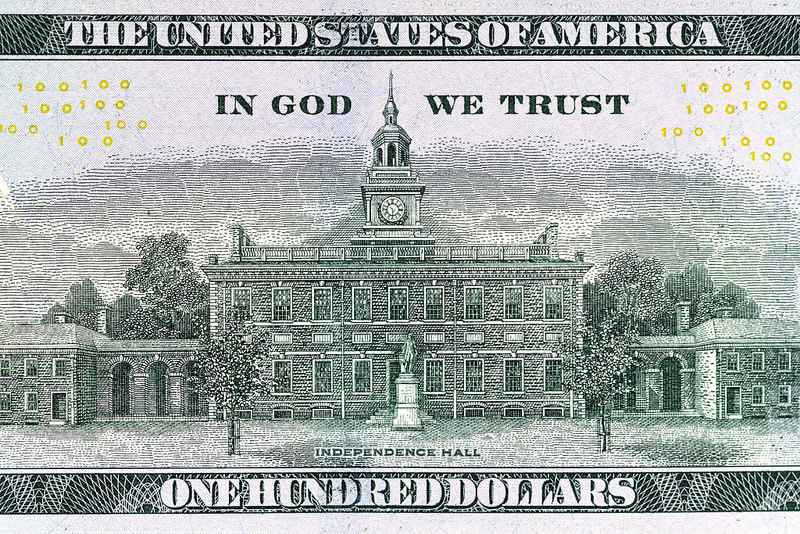|
"In God, whose word I praise, in God I trust; I will not be afraid. What can mortal man do to me?" (Psalm 56:4) It is this Scripture and many others in the Bible that may have inspired a Baptist minister from Ridleyville, PA, named Rev. Mark Watkinson, to write a letter to the Treasury Secretary in 1861. He urged the Secretary to recognize "The Almighty God in some form on our coins." This set into motion a move in the U. S. Congress during President Lincoln's administration to place the motto on two cent pieces. The coins with this motto were approved in 1864. In 1956, the 8th Congress passed legislation that the phrase "In God We Trust" must appear on American currency. President Dwight Eisenhower approved it. The same Congress also unanimously passed a law declaring that this phrase should be the United States national motto.
Is it not our acknowledgement of and dependence on God that sets apart America from all other nations? The writers of the Declaration of Independence gave God glory for the establishment of our nation in which we have the freedom to pursue "life, liberty and the pursuit of happiness.” They also acknowledged that the unalienable rights of men were given "by their Creator." Yet, there are those in our country who desire to eradicate every reminder of our Judeo-Christian roots. Recently, Satanist Kenneth Mayle challenged the constitutionality of the phrase "In God We Trust" on our U. S. currency. His contention is that he is being forced to spread the message of Christianity and that his First Amendment rights and the Religious Freedom Restoration Act (RFRA) are being violated. Judge Diane Wood of the 7th Circuit Court of Appeals in Chicago decided that Mayle's rights as a non-monotheistic believer were not violated, and that the motto "In God We Trust" is "one of many historical reminders" that should not be perceived "as a religious endorsement." Other challenges to the motto came before this one. In 1970 there was an unsuccessful attempt to take "In God We Trust" off of our currency. The District Court said, in part, that the motto has "spiritual and psychological value and inspirational quality." Even though an appeal was filed with the Supreme Court, they declined to hear the case. Another challenge occurred from 2006 to 2010 but never got traction. A case filed in 2013 was also defeated. Although America is characterized by a diversity of religious beliefs and practices, there is no doubt that our founding fathers were primarily God-fearing people who intended that this nation honor God and follow His laws. In the year 2006, the 50th anniversary of the adoption of "In God We Trust" as the national motto, the Senate reaffirmed the resolution. Five years later, the House of Representatives did the same thing. As we begin our week of celebrating Independence Day, how should we respond to what is happening in our country? While it is true that there is a remnant that is crying out to God for revival to come to our nation, the Church has been somewhat ineffective in the past in leading the way to placing God back on the throne of our land. We must demonstrate the truth of our national motto, "In God We Trust," by living a life worthy of His sacrifice and carrying His light wherever we go. Let the inspirational words of our United States Anthem, The Star-Spangled Banner, written by Francis Scott Key in 1814, inspire us. It is the 4th stanza that contains the declaration of our trust in the Almighty God: "Oh, thus be it ever, when freemen shall stand Between their loved home and the war's desolation! Blest with victory and peace, may the heaven-rescued land Praise the Power that hath made and preserved us a nation. Then conquer we must, when our cause it is just, And this be our motto: 'In God is our Trust.' And the Star-Spangled Banner in triumph shall wave O'er the land of the free and the home of the brave!" |
Joan E. MathiasCategories
All
Archives
July 2024
|

 RSS Feed
RSS Feed